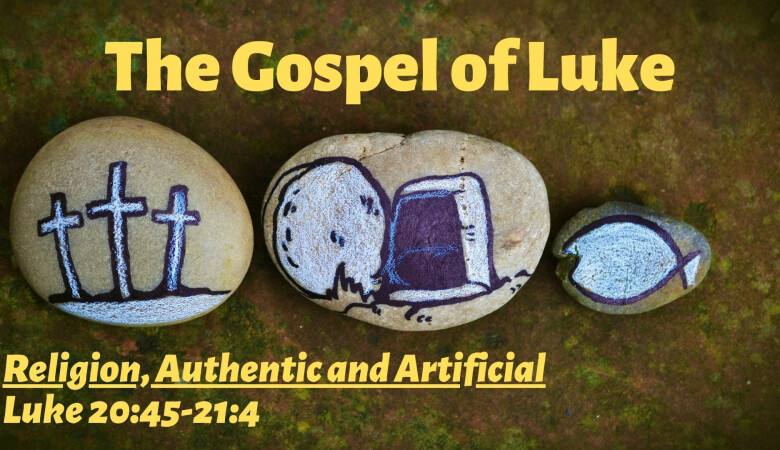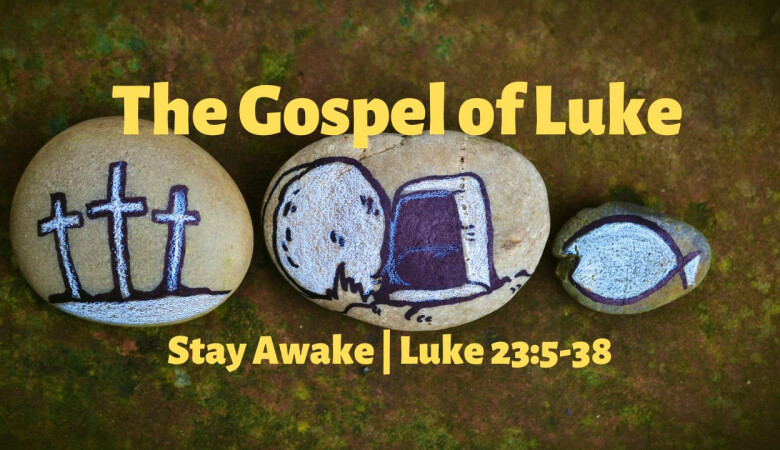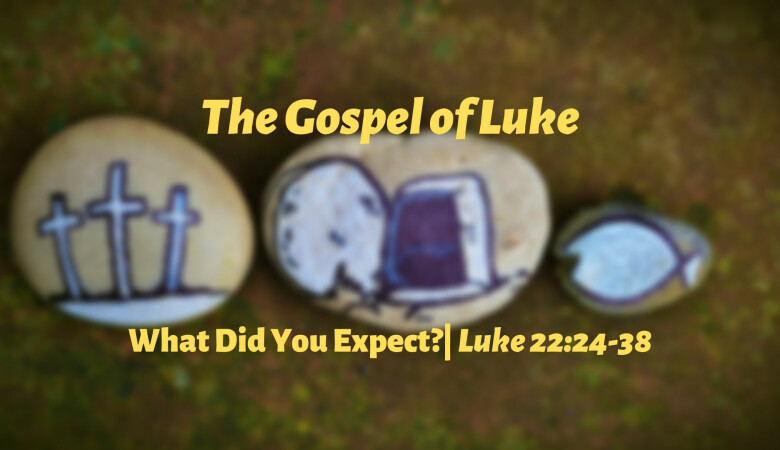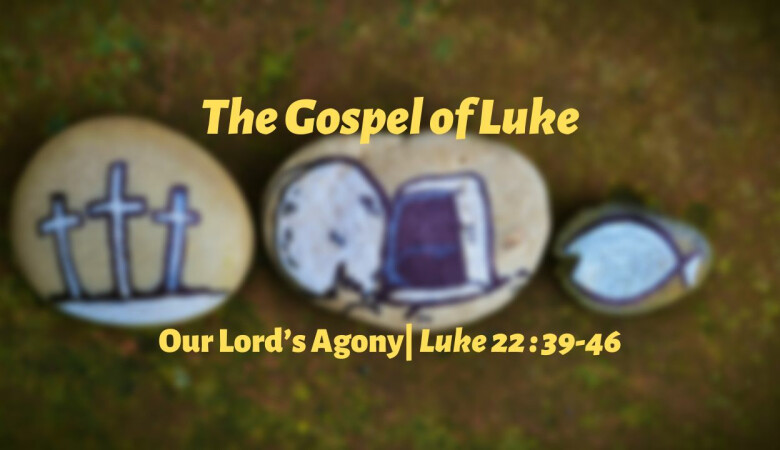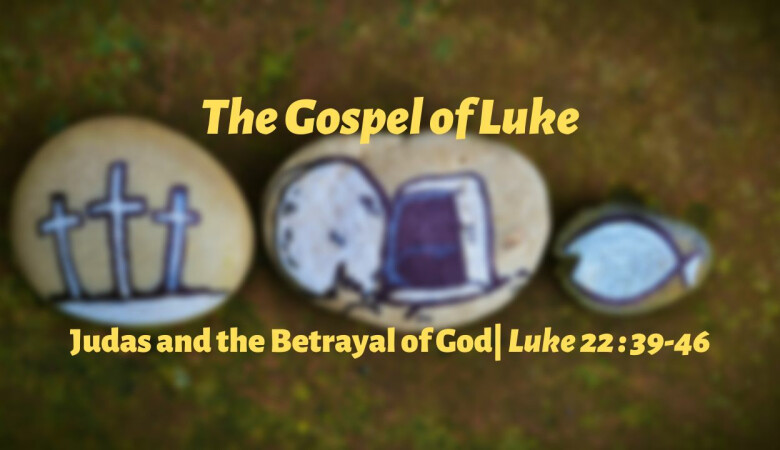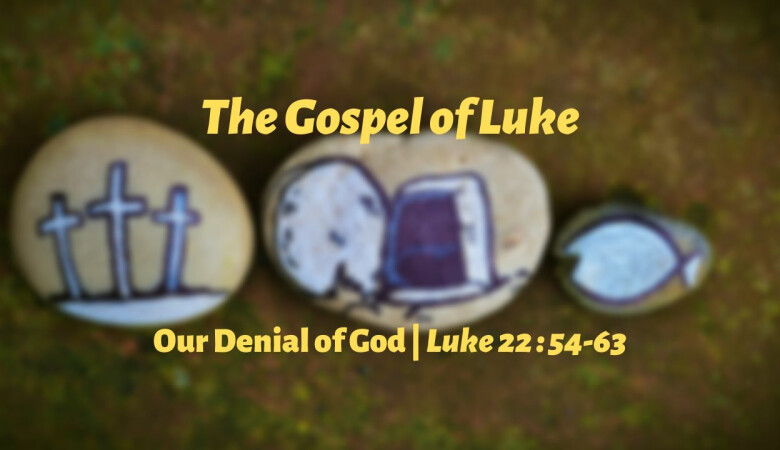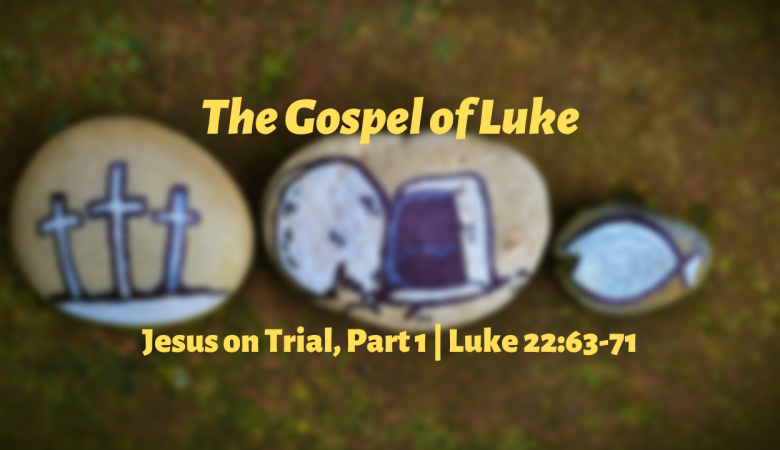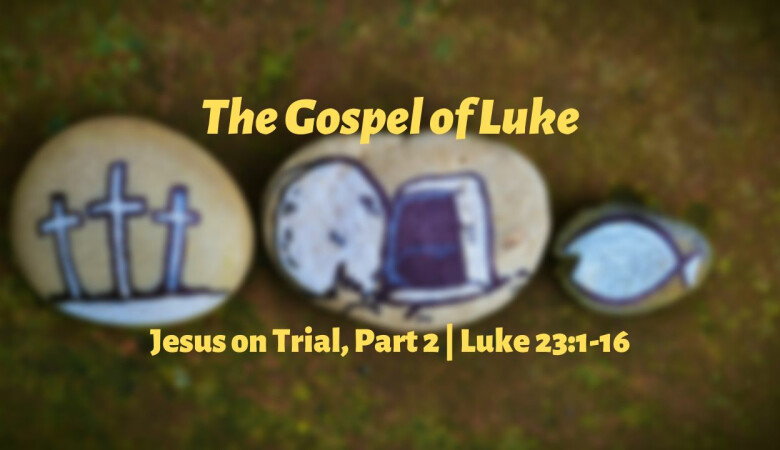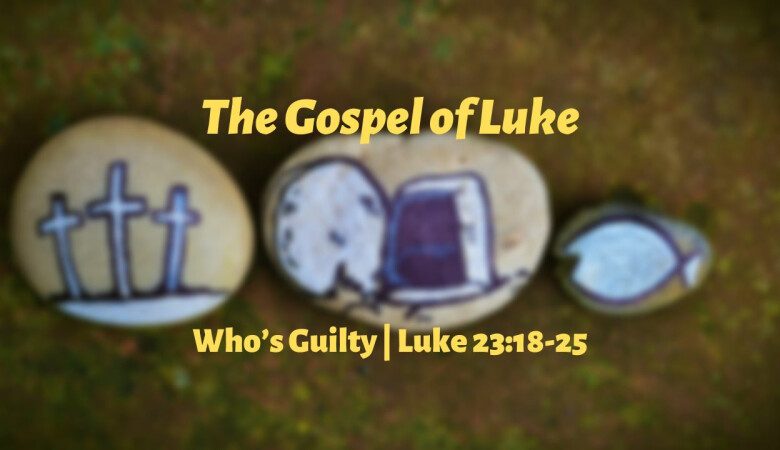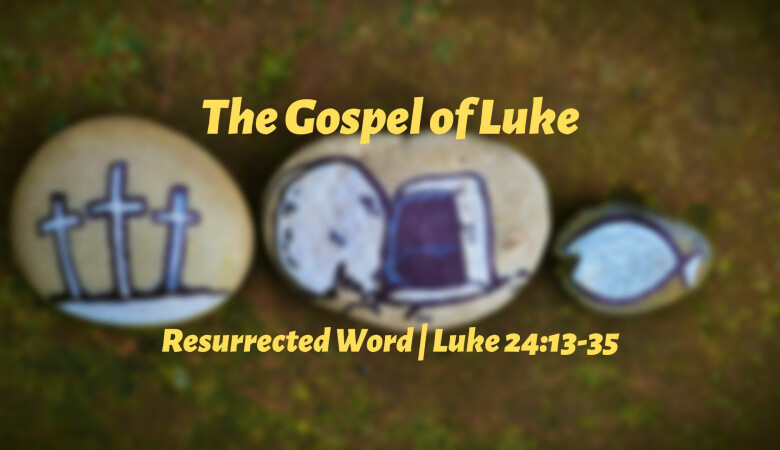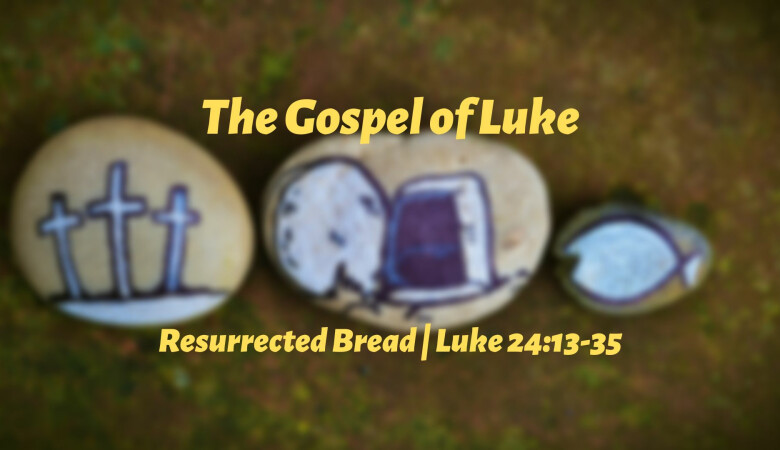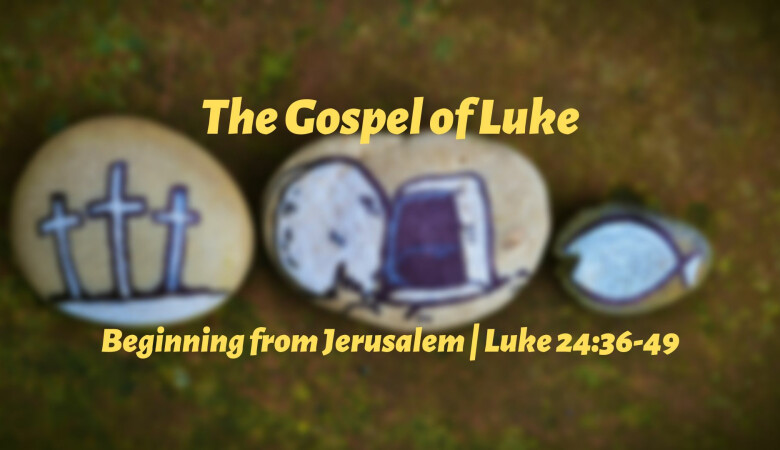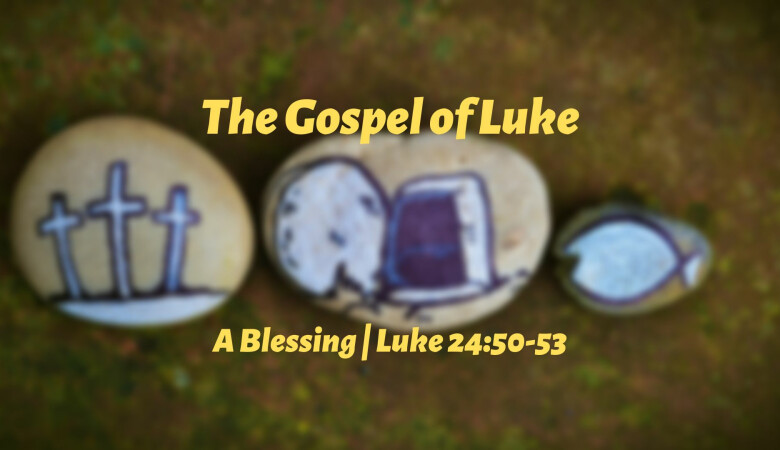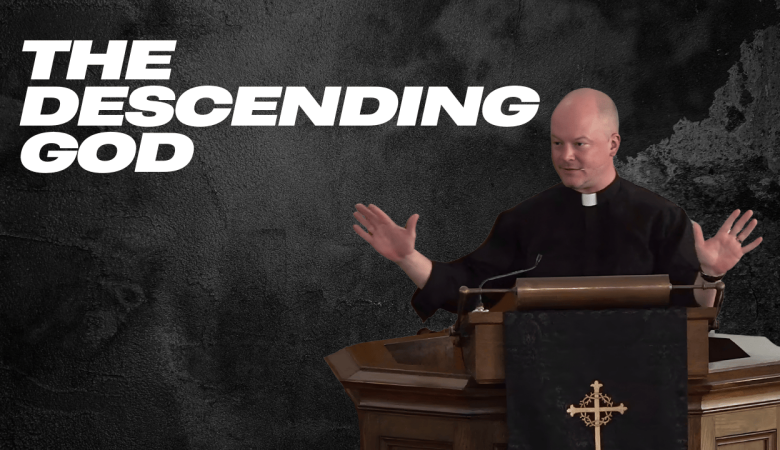Series: Luke
Weep for Yourselves
March 17, 2024 | Peter Rowan
Passage: Luke 23:26-31
ALL SERMONS IN SERIES
Summary
As we make our way our way with our Lord through the streets of Jerusalem to the place of the Skull, Luke gives us two short vignettes, two short encounters with others. There are women mourning what is happening to Jesus. They are likely mourning death, but even more mourning the fact that the Romans have the power they have and kill the way they do. To them, Jesus says, "Mourn for yourselves, because if they do this to me who they have declared innocent, how much more will they do to you?" Cancelling one another is the way of the world, from Cain to the Romans to us here today in the 21st Century. But also Luke tells us of Simon of Cyrene. Simon made the long journey (17 days walk!) to specifically celebrate the Passover, the great feast that remembers that God saved his people from oppressors. But as he is entering the city to celebrate this great story he is tapped on the shoulder by the current great oppressor of Israel, the Romans, and he is made to carry their symbol of oppression, the cross. Somehow - we are not told how, but how could it not have been at the foot of the cross! - Simon becomes a Christian and so do his children. Through the forgiveness of God, the people that are inclined to cancel, to write off, to dismiss and discard, become the people of forgiveness and grace.
Transcript
To cancel is human, to forgive is divine.
Today is St Patrick’s Day. Here in the States we largely remember his legacy by revelry and drinking too much, which is really a shame. As Christians, we have a good many to celebrate his life and ministry, not the least of which was his missionary contextualization of the gospel to the people of Ireland. But what I want you to learn this morning is that went to he very people that enslaved him. Patrick was taken by the Irish when he was 16 and enslaved and there in Ireland (though he was raised in at least a nominally Christian family), he had his first experience with God, his first conversion. After 6 years of slavery he was able to escape and headed back to England. By God called him back to the very people that he would have been inclined to cancel, the very Irish that enslaved him he forgave and brought the gospel of the forgiveness of God.
To cancel is human, to forgive is divine.
We come in our Long study of Luke to where Jesus is finally bearing the cross. He is not been nailed up on it yet (we will get there next week), but today we see the scene that Luke gives us of Jesus being brought through the streets of Jerusalem to the place called The Skull where he would be crucified. And as he makes this journey through Jerusalem on one it’s busiest days of the year where people have flocked from all around the Mediterranean to fill the city for the great feast of Passover, he is most certainly surrounded Roman soldiers and onlookers. Many of the onlookers would have detested the Roman occupation of their land, but all the same an execution often brought out a crowd. Some in that crowd would have been there simply for the spectacle. Probably many in the crowd would have been the religious leaders who had been plotting his death. Many in the crowd would have been those who were actually mourning the reality that Rome had such power to execute Jews. The streets would have been filled with the likes of who we have before us. People who were from far off who had made the pilgrimage to Jerusalem for the great Passover Feast and women who were mourning.
I want you to see today through these little vignettes that are given on this road with the cross, a great lesson.
To cancel is human, to forgive is divine.
First, to cancel is human.
You likely know what I mean by “cancel”. Someone says something or does something offensive and that person at the very least has their platform taken away. Of course I could mention celebrities and give you stories from today of this happening. But it is not anything new. Not at all. I want you to think of a couple stories that we have in the Bible.
One of my favorite Bible stories is the story of Jesus with a woman at a well in Samaria. Jesus was a good Jew and good Jews would have walked all of the way around the area of Samaria if they were going from Galilee to Judea where Jerusalem was. Jesus was from Galilee in the North and had been in Jerusalem here and there throughout his life. He would have know the right route to take if he were to avoid the Samaritans. He would have known that because they worshipped at different places and because their bloodline wasn’t pure, that they had been canceled. They had been written off. They were despised by the Jews. Yet Jesus goes through Samaria. Not only does he go through this canceled area, but he goes to a well and sits with a women who was there by herself at the hottest part of the day. Why was she there? Well, because she had been canceled by her community. The women of the town would have fetched water together in the morning or in the evening. It would have been safer that way and it would have been a great deal cooler. You wouldn’t fetch water around noon unless it was the only time you could. She had been shunned. And what we know that at least in part that was because she had had 5 husbands. We don’t know why. Maybe they all through her out. Maybe they all canceled her. Maybe she was a part of it. The man she was currently living with wasn’t her husband. She had been canceled. To cancel is human.
How about another story.
Later on in John, in chapter 8, some Pharisees bring Jesus a woman who had been caught in adultery. They bring Jesus the woman to test him. The law said such a woman should be stoned”, they remind Jesus. They want to cancel her and they are thinking they could maybe cancel Jesus. But he puts it back on them. “Let him who is without sin among you be the first to throw a stone at her.” He replies.
To cancel is human, to forgive is divine.
Let me tell you another story.
In Luke 4 Jesus goes to the synagogue in Nazareth, the town where he is from. He reads from the scroll of Isaiah and he tells the people some hard things and they don’t like it. This is what they do: (Lk 4:28-29) 28 When they heard these things, all in the synagogue were filled with wrath. 29 And they rose up and drove him out of the town and brought him to the brow of the hill on which their town was built, so that they could throw him down the cliff.
To cancel is human.
Let’s look at the mourning women of our passage in Luke 23.
27 And there followed him a great multitude of the people and of women who were mourning and lamenting for him. 28 But turning to them Jesus said, “Daughters of Jerusalem, do not weep for me, but weep for yourselves and for your children. 29 For behold, the days are coming when they will say, ‘Blessed are the barren and the wombs that never bore and the breasts that never nursed!’ 30 Then they will begin to say to the mountains, ‘Fall on us,’ and to the hills, ‘Cover us.’ 31 For if they do these things when the wood is green, what will happen when it is dry?”
Some people say this is Jesus last sermon. It is the last lengthy words he says. Of course on the cross he has some other things to say, but they are all understandably short. And I wonder what you would think would be Jesus last lengthy words. Maybe a reassurance of his resurrection. “Don’t worry. You don’t need to cry so much. This is going to be awful. But I will rise again and there will be a day when all things are made new!” Maybe something like that?
But no. Jesus says weep for yourselves and for your children. And why? Well, he grabs on to three images that we have in the prophets - like in Hosea that was read for us this morning. ‘Blessed are the barren and the wombs that never bore and the breasts that never nursed!’ 30 Then they will begin to say to the mountains, ‘Fall on us,’ and to the hills, ‘Cover us.’ 31 For if they do these things when the wood is green, what will happen when it is dry?” Childbearing was often a sign of blessing in the Old Testament. He says there will be a day when you will wish that you had born no children because the situation is so awful. You will consider the woman who has children to care for blessed, the one who was infertile and barren blessed. He says there will be a day when you will want to die. You will want creation to take your life. mountains to fall on you, hills to cover you up.
Finally, he says if they will kill green wood like this, wait until they have the opportunity to bring the dry wood. He is saying, if they do this to me, who is righteous and good and they have been able to find no fault in me, weep for yourselves. If they have been successful in canceling me in this regard, parading me around the streets of Jerusalem, mocking me, spitting upon me, beating me, pushing the crown of thorns upon my head, weep for yourselves at what is to come!
Now, there is debate, I should tell you this, there is debate around this passage.
In part it is because these are images of a day of divine judgement in the Old Testament, but I think the better way of understand this passage is that it speaks of the destruction of Jerusalem that would happen about 40 years later. The Romans suppressed a Jewish revolt. And the conditions became so bad in the besieged city of Jerusalem that people were absolutely rabid for food. The historian Josephus describes it and it is awful. Jews attacking other Jews for food. People bursting into other homes looking for scraps. The worst kinds of animals being caught and eaten. Belts and shoes being chewed. He even describes canabalism within families. There is no question that there came a day when the barren woman would have been called blessed and people desired their death.
To cancel is human.
Now, I want to stop for a moment. We are in an election year. I know that many of you dread that fact and many of you know that I do as well. It seems to me that this propensity that we have to use our power to silence others and get what we want is more prevalent in these kinds of years. Please, please try to resist the inclination that we are all being taught to demonize and cancel those who disagree with you politically. It’s not new to us. It is human and it is ugly.
What’s the purpose of Jesus giving this short sermon while he is on the road to the place called The Skull? Is he just bent of being sensational? Is he caught up in the moment and just wants to be terrifying? I don’t think so. I think he really is full of compassion. He really longs for repentance and a turning away from sin and this embodiment against the divine way of being that is happening right here in this story.
I read a story of Dr Peter Bamm, who was a head medical officer for the Germans in World War II. There was a time when the Germans were fighting in Crimea and the moral was so low that many soldiers were inflicting wounds upon themselves so they would be brought home and cared for. Often these wounds would be powder burns and if they were found out that they had self-inflicted wounds they would be court-marshaled and shot. So Dr Bamm was examining the wound of a young man who was barely 18 years old, he hadn’t even begun to shave yet and had just two weeks of training before he was sent to the front line. Dr Bamm had no desire for this man to be sent to the firing squad, but he knew that this man had burned himself. So Dr Bamm took his scalpel and widened the young man’s wound. He destroyed the evidence that this wound was self-inflicted. Dr Bamm’s severity in the situation saved the man.
I think this is Jesus’ intent. He wants to lead us to repentance. He want us to flee from sin and to him. He wants us to do away with this disgusting way that we dismiss others, hate others, cancel others, and in-so-doing hang him to the cross.
To cancel is human, to forgive is divine.
So let’s look for a moment at Simon of Cyrene.
Verse 26 26 And as they led him away, they seized one Simon of Cyrene, who was coming in from the country, and laid on him the cross, to carry it behind Jesus.
Simon was greek for the Jewish name Simeon. Simon lived in Cyrene which was a city near the Mediterranean in what is now Libya. It’s sort of just south of Greece on the North African coast. Cyrene was a city divided into four districts and it’s Jewish population was so large that one of those districts was the Jewish district. To be a devout Jew would have meant a few things. One thing it would mean is that you would have always wanted to go on a pilgrimage to Jerusalem and especially to Jerusalem during great feast of Passover. It would have also meant that you longed to be back in the Holy land. You longed for the day when a true Jewish King was on the throne and the Jews were once again free from occupation. To be a faithful Jew was to, in a way, hate the Romans for their occupation of your land.
So Simon made the journey from Cyrene to Jerusalem. It would have taken about 17 days to walk that journey. He would have had to make all kinds of preparations, saving his money. He likely would have worn his best clothes. He would have said every year at the end of the passover meal, “Next year in Jerusalem.” And he would have said this because the Passover meal was the great feast when God’s people remember that God had saved them from slavery in Egypt, from a great oppressor. And he would have seen Rome as the great new-Egypt, the great oppressor of God’s people, the occupier of their land.
So he makes the journey to Jerusalem and like a lot of others, he likely had made camp outside of the city and had woken up that morning to go to Temple, the great place of worship. And as he is going in from the country into the city he is tapped on the shoulder by a Roman sword. That’s what would have happened. Roman soldiers could summon others to work. And this great enemy of his people, summoned Simon to cary a cross. The cross was the great symbol of Roman oppression and now Simon, who was likely wearing his best clothes is having them smeared with the blood and dirt of a Roman cross. Imagine what hatred he would have had for the Romans in that moment. Imagine the bitterness of his heart in that moment. Imagine how much he would want to cancel any life he might have with any Roman in the future.
But the story doesn’t end there.
But then he made his way with Jesus to the place called The Skull. And we don’t exactly know what he then did, but I can’t help but image that there at the golgatha, he heard the words of Jesus. “Today you will be with me in paradise” to a robber, a thief. “Father, into your hand I commit my Spirit” to the father. And “Father, forgive them, for they know not what they do,” to the very romans who crucified him there on the cross.
Why do I say that I think that’s what happened?
Well, why do we know his name? How in the world do we have his name recorded for us and where he was from recorded for us? Well, because he became part of the community that recorded these things, he gave his life to following this man Jesus who died on a Roman cross.
And what’s really wild, is that if we turned to the gospel of Mark, a gospel that most people believe was written with the aid of the Apostle Peter to a Roman audience, we would read that Mark tells us that he was the father of Alexander and Rufus. You don’t mention his sons unless his boys were known to the community of faith that Mark was writing to! They had become christians too and were now likely in Rome!
And get this: You heard from Romans 16. There in that list of greetings Paul greets Rufus. 13 Greet Rufus, chosen in the Lord; also his mother, who has been a mother to me as well. This Rufus is almost certainly the same Rufus. And Simon’s wife, Rufus’ mother was like a mother to Paul! And they were there in the church in Rome!!!
I don’t this, we don’t have this recorded for us, but I can’t help but think that Simon’s life was utterly changed that day he carried Jesus’ cross and not because he carried the cross but because he saw Jesus forgive on the cross. His bitterness change to wonder and amazement. The severity of judgement that Jesus bore, lead to Simon’s wonder and to faith and to forgiveness. In the place of his hatred he found his life.
To cancel may be human, but to forgive is divine.
Series Information
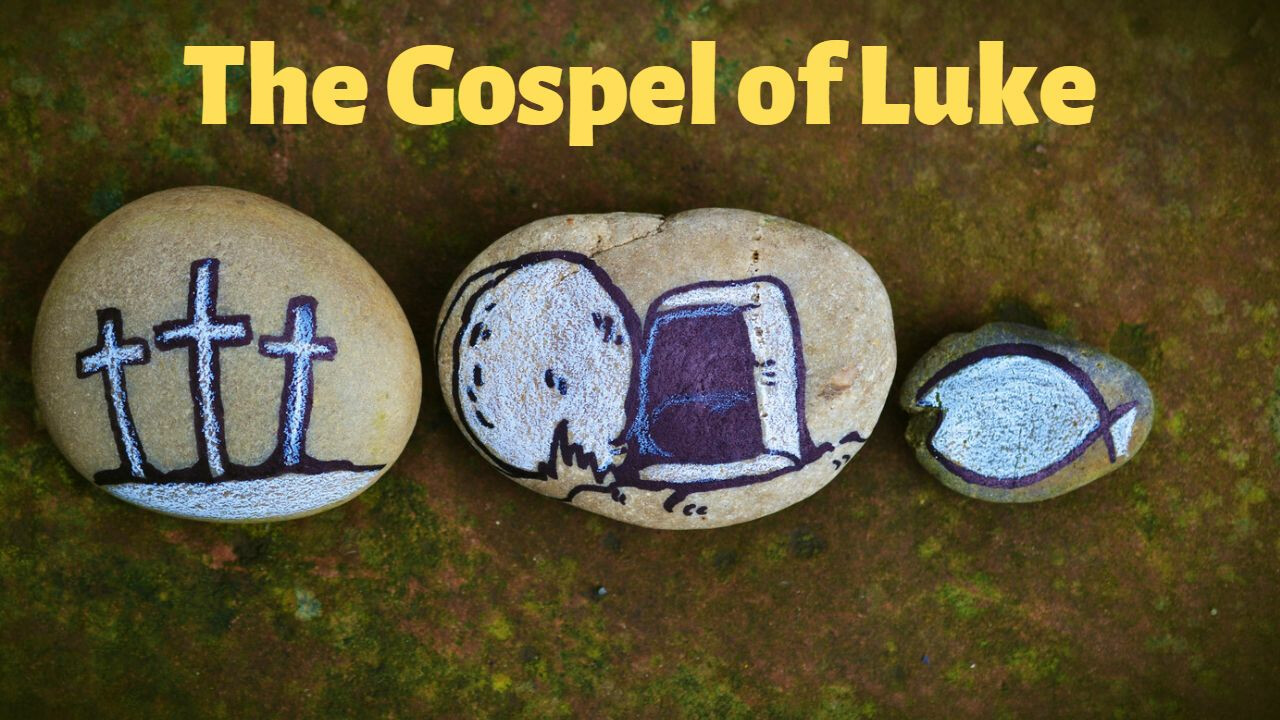
The Gospel of Luke is best described by its author in the first four verses of the book: "Many have undertaken to draw up an account of the things that have been fulfilled among us, just as they were handed down to us by those who from the first were eyewitnesses and servants of the word. With this in mind, since I myself have carefully investigated everything from the beginning, I too decided to write an orderly account for you, most excellent Theophilus, so that you may know the certainty of the things you have been taught."


